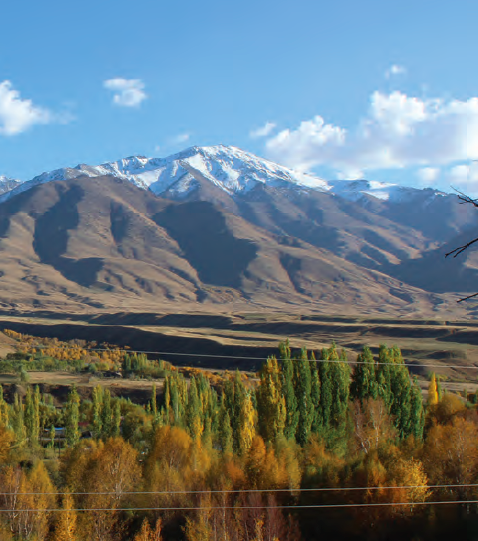Nutrition in Mountain Agro-ecosystems
 Shakhnoza Kurbanalieva has an MBA and ten years’ experience in Kyrgyzstan and Bangladesh and is currently coordinating the Nutrition in Mountain agro-ecosystems project at the International Organisation for Organic Agricultural Movements (IFOAM).
Shakhnoza Kurbanalieva has an MBA and ten years’ experience in Kyrgyzstan and Bangladesh and is currently coordinating the Nutrition in Mountain agro-ecosystems project at the International Organisation for Organic Agricultural Movements (IFOAM).
Background
A disproportionately high number of the world’s hungriest and most chronically malnourished people reside in mountainous regions of the world (FAO, 2002). These regions often have difficult climatic and topographic conditions, scarce arable land resources and poor infrastructure. Numerous impact studies (UNCTAD 2013, CDE 2010) have shown the potential of programmes for improving agro-ecological practices for poverty reduction and nutrition impact, particularly in marginal and mountainous ecosystems. However, these programmes have not yet reached many remote communities living in these areas.
In June 2015 IFOAM – Organics International1 launched a Nutrition in Mountain Agro-ecosystems project (NMA) for rural communities across five mountainous countries: Nepal, Pakistan, Kyrgyzstan, Ethiopia and Peru. The NMA project aims to link remote communities, diversify diets through nutrition-sensitive agriculture, and facilitate replication and scale-up of sustainable agricultural practices to impact local, national and global levels. The first phase of the project (2015-2018) is implemented by a consortium and national partners2 under the lead of IFOAM – Organics International. This article highlights the approach and activities planned in the current phase.
Definition of micro-interventions
The likely NMA activities will focus on adapting agriculture, marketing and consumption for better nutrition, particularly of children and women, through increased diversity of diets in a changing environment, including social, economic and climate changes. The interventions are identified through participatory methods and aim to have a direct impact on the situation of small-scale farmers and households in rural areas and generate insight and knowledge on nutrition-sensitive interventions.
Mountain in Agro-ecosystems Action Network (MAAN)
People living in mountainous areas often lack information about the latest agricultural practices and have limited access to and knowledge about diversified food. The Mountain in Agro-ecosystems Action Network (MAAN) initiated by the NMA project, is an internet-based social and knowledge network of Rural Service Providers (RSPs) around the world. RSPs are made up of government actors (agriculture or health extension), civil society grassroots workers and activists, community representatives, progressive farmers and farmers’ organisations, business agents (such as veterinarians, input salespersons and buyers), teachers and many others interested in sharing knowledge and learning about nutrition-sensitive agriculture in mountainous areas. The use of the MAAN virtual platform allows the RSPs to access ready-to-use information, link with like-minded people, expand their social and knowledge network, and to access training and coaching through online discussions.
The NMA project offers a tailor-made Capacity Development Programme for RSPs in each NMA country. This consists of two face-to-face events at the beginning and the end of the course with online interactions throughout the MAAN platform. The course starts with a call for RSPs to apply and present their ideas linked to the needs of communities to improve nutrition status. The first course took place in Pakistan following the Conference on Nutrition Sensitive Agriculture in Mountain Areas, March 29-April 2 2016, in Islamabad, Pakistan.
Advocacy and communications
The project focuses on the replication and scaling-up of tested agriculture practices and food systems. Advocacy and communication are a large part of the project. Advocacy messages are developed from the results of micro-interventions implemented by the RSPs during their training programme.
The information and knowledge from the field is continuously shared on the MAAN platform, which is accessible to all users. The evidence-based information and knowledge will be available after rolling out the Capacity Building Programme. The national-level interventions are concerned with knowledge-sharing that aims to improve the national policies and engagements in nutrition-sensitive agriculture, thereby improving the living conditions of the rural poor. They also empower countries to take part in global nutrition debates, based on the first-hand experience of local, micro-intervention implementation for duplication/scaling-up of successful approaches on nutrition-sensitive agriculture.
The way forward
- At local level, the project relies on the internet-based MAAN platform. Accessing the platform is a challenge in some remote areas of target countries. To mitigate this challenge, the project provides a mobile-phone version of the platform and focuses more on physical meetings with rural communities. The trainer RSPs are the key target group to bring the knowledge and information from the communities into the MAAN platform and call the users for debates and discussions.
- National-level activities rely on good collaboration and relationships with national decision-makers like ministries of health and agriculture who can influence national plans and programmes on nutrition. Thus, based on the evidence and messages collected from the micro-interventions, it is important to align the project with national committees and platforms, as well as initiate synergies with like-minded organisations.
- Global advocacy is equally important to influence high level organisations in international fora. It is important to obtain practical examples as actual evidence that can be showcased to stakeholders in the global nutrition discourse, as well as focus on players like the UN Food and Agriculture Organization and the SUN Movement.
For more information, visit this link.
References
1 Organics International (IFOAM) is an umbrella organisation of Organic Agriculture worldwide. See the link
2 Consortium partners are Helvetas and FiBL. National partners are Helvetas Swiss Inter-cooperation in Nepal; Intercooperation in Pakistan; Bio Service Public Foundation in Kyrgyzstan; Institute for Sustainable Development in
Ethiopia; and IFOAM Organics International in Peru.
CDE 2010. Impact Assessment - Organic Cotton in Jalalabad Oblast, Kyrgyzstan, Centre for Development and Environment, January 2010.
FAO, 2002. UN Food and Agriculture Organization Press Release 16 June 2002.
UNCTAD 2013. Report of the UN Secretary General on Agricultural Technology for Development, UNCTAD Trade and Environment Review 2013.
